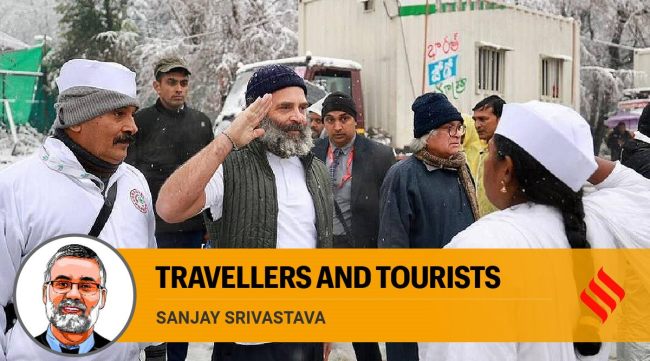Opinion Sanjay Srivastava writes: With Bharat Jodo Yatra, Rahul Gandhi’s stature is enhanced. But has it struck a wider chord with the people?
In a milieu characterised by a search for a homogenous national identity and anti-politics, BJY runs the risk of being interpreted as going against the “true” national interest at best and a political gimmick, at worst
 Congress leader Rahul Gandhi during the Bharat Jodo Yatra in Srinagar on Monday. (Express Photo)
Congress leader Rahul Gandhi during the Bharat Jodo Yatra in Srinagar on Monday. (Express Photo) One of our greatest thinkers, the largely forgotten polymath Rahul Sankrityayan (1893-1963), imagined yatra and wandering as forms of thinking and forming a world view. In his book Ghummakkad Shashtra (The Wanderer’s Shashtra), published in 1948, Sankrityayan suggests that yatra should lead to a sense that “it is intensely human to help strangers and to consider it one’s duty to offer assistance to those whose language we do not understand”. Rahul Gandhi may or may not be familiar with Sankrityayan’s writings. However, the recently concluded Bharat Jodo Yatra (BJY) borrows from a long tradition of writing and thinking about travel as a mode of contemplating the world. That said, something has changed over the years. We are no longer the travellers we once aspired to be. Our aspirations may have become more touristic.
BJY sought to revive the meaning of wandering across unfamiliar territories as an act of dialogue across religious, linguistic and cultural differences. It was based, of course, on a utopian vision of the possibilities of co-existence in a phenomenally diverse society. It also sought to question a key Indian characteristic: We mainly know how to be kind to those we know (members of our caste, kin, and people from our religious networks, for example) and appear to have lost the capacity for dealing with difference and unfamiliarity. Utopian visions of society are at the heart of some of the most important social transformations. But the politics of Utopianism represented by BJY – the possibility of recognising a common humanity through the barriers of difference – remains quite distant from its political dividend. There are reasons for this.
The Yatra’s objective as the regathering of a national public comes at a time when the idea of national identity has become firmly linked to an imagined global one that is tightly bound to notions of impressing an (imagined?) international audience. Indian life only finds meaning in as much as it provides a global patina to Indianness. Global achievers of Indian origins, the ways in which Indian thought and philosophy had already “predicted” a variety of modern developments and India’s new-found standing on the global stage are the key narratives of our times. This is an important shift in popular thinking from that prevalent in earlier decades. This also means that any national event that cannot be presented as enhancing India’s global identity and prestige might have little public purchase in terms of electoral gains. BJY’s focus was on the state of Indian life, rather than its “global” status.
Then there is the rise of statist nationalism. This relates to the consolidation of a strict hierarchy between the people and the state. Indian democracy has historically been a state (rather than people) led one, with the state determining what may or not be said in public and how we might behave towards each other. However, it increasingly appears that the dictates of statist nationalism have also become acceptable among citizens. The idea that the state is supreme and beyond criticism has emerged as the most commonly accepted form of national duty. The public imagery of Bharat Jodo Yatra, in contrast, tended to give a sense of intimacy between the public and political leaders — the public could mingle on equal terms with its leaders. Currently, political dividends are more likely to accrue to muscular statist nationalism.
The not-so-subtle shift in the ways we now choose to imagine relationships between the state and citizens has been accompanied by the rise of a new kind of citizen figure. This is a citizen who is “anti-politics” and believes that social change is best achieved through the lack of proper political processes. This growing belief has consolidated the idea that society is best governed through “politically neutral” tools such as technology and actions by leaders that do not take account of social circumstances. The latter, it is now increasingly thought, merely leads to “appeasement”. BJY was an event that sought to highlight the differences that must be accounted for to address the actual, rather than the imagined national life. In a milieu characterised by a search for a homogenous national identity and anti-politics, it runs the risk of being interpreted as going against the “true” national interest at best and a political gimmick, at worst.
The rise of the anti-political citizen – a change from the context of early nationalism – is also linked to another scenario that may have affected the ways in which those who thronged BJY’s various stages may have engaged with it. This is the rise of a new kind of culture of spectacle, one that is now an active part of the making of political life at the highest levels. Through new forms of social media – where, say Facebook and Instagram are both the means and end to identity-making – the spectacle has become everything. Taking part in spectacles is itself meaningful and nothing exists outside it. This contributes to the making of new public realms where involvement with spectacular public events is both the means and the end for self-validation. It is, then, impossible to say if the Yatra’s actual meaning lies in its role as a public spectacle or the kinds of issues Rahul Gandhi might have been trying to raise, those relating, for example, to corruption or tolerance or the need for dialogue.
Ironically, given the uncertainty of the Yatra’s utility for his party, it does appear that Rahul Gandhi’s personal stature as a politician stands considerably enhanced. There is acknowledgement of his capacity for raising questions that many think are important – though just not important enough to outweigh Narendra Modi’s appeal – as well his mental and physical fortitude. If only for these reasons, the Yatra has been an important event. It has contributed to the rebuilding of Congress’s prospects in the long term. In the immediate future, Rahul Gandhi’s personal stocks are higher than before, though his party needs to overcome several handicaps. The traveller does not any longer achieve a special quality through reflecting on the difficult questions of nationhood – as Sankrityayan once imagined. For, the traveller is pitted against the desire of the tourist for instant gratification.
The writer is British Academy Global Professor, Department of Anthropology and Sociology SOAS, University of London





